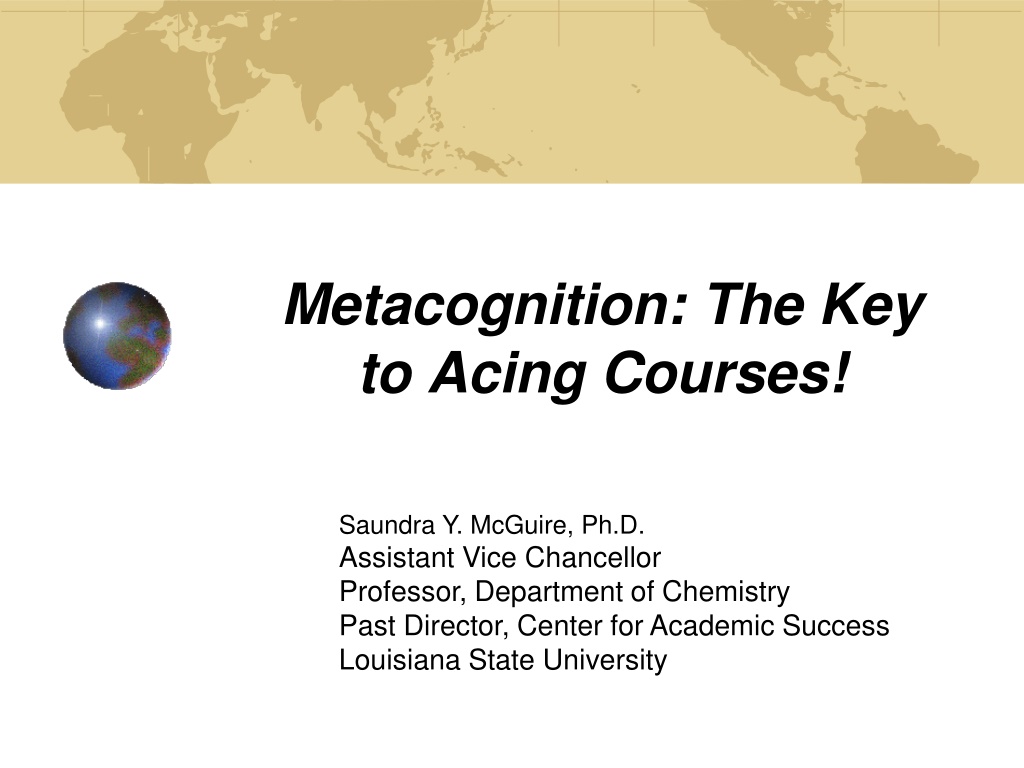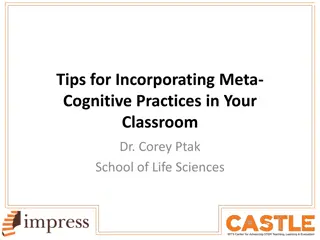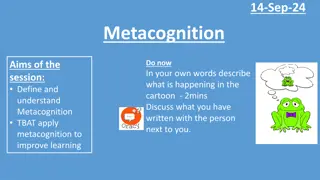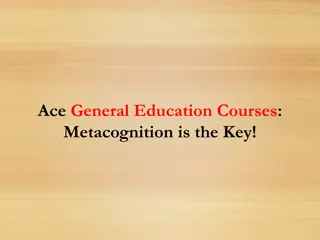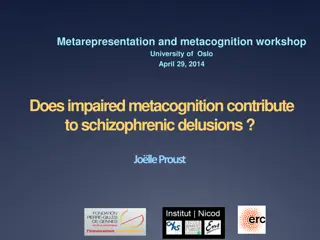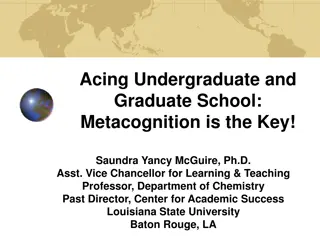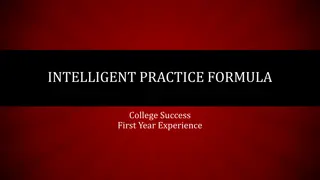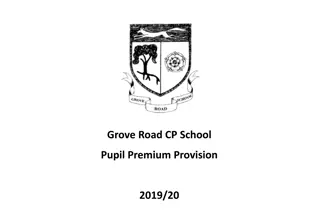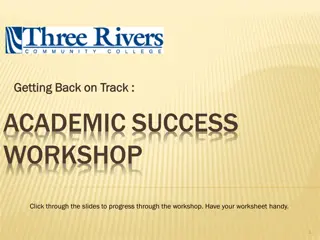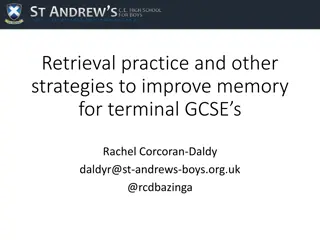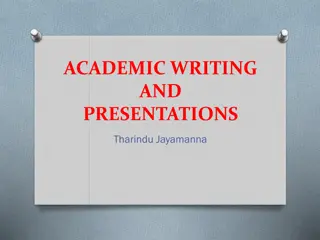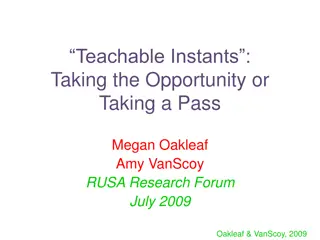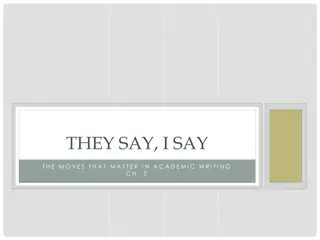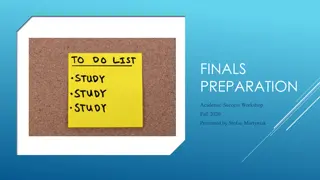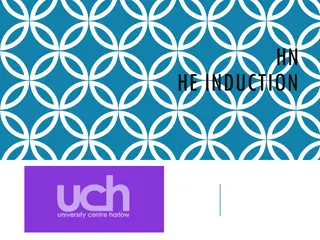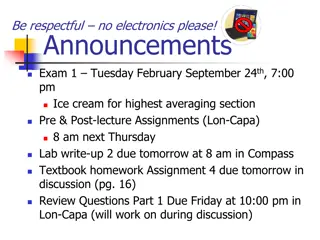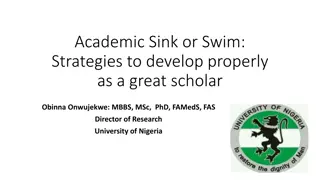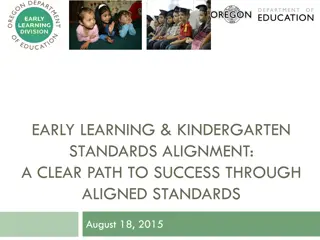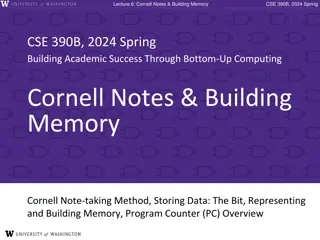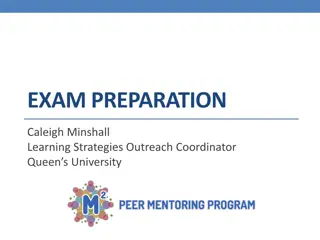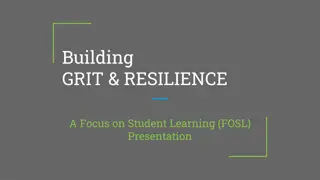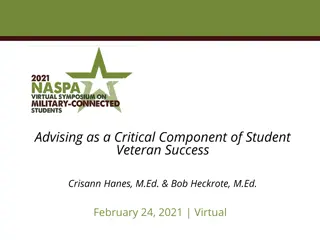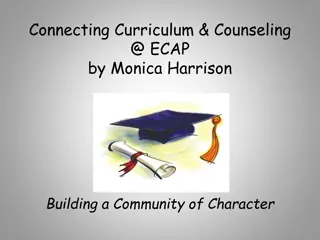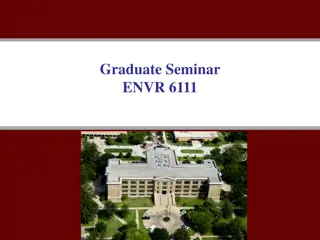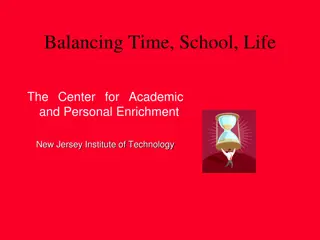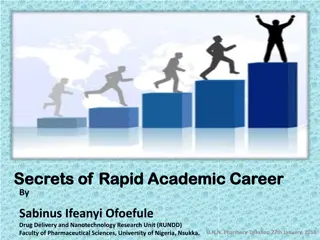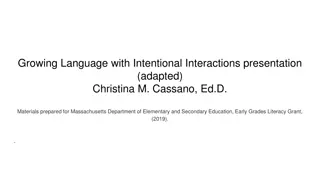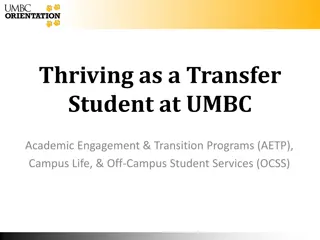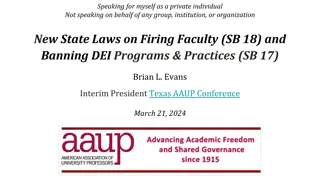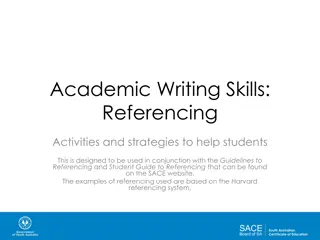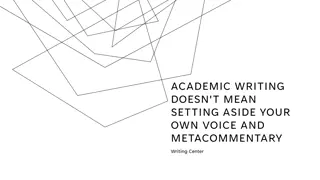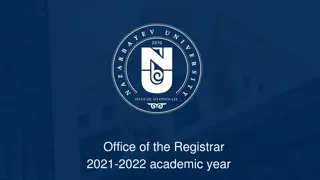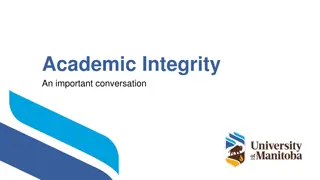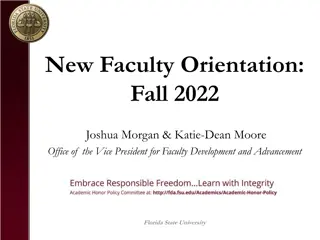Mastering Metacognition in Education: Strategies for Academic Success
Learn the power of metacognition and how it can help you excel in your academic courses, especially in challenging subjects like Chemistry. Discover tips for making the most out of homework, developing your problem-solving skills, and becoming an expert learner through conscious awareness of your learning process.
Download Presentation

Please find below an Image/Link to download the presentation.
The content on the website is provided AS IS for your information and personal use only. It may not be sold, licensed, or shared on other websites without obtaining consent from the author. Download presentation by click this link. If you encounter any issues during the download, it is possible that the publisher has removed the file from their server.
E N D
Presentation Transcript
Metacognition: The Key to Acing Courses! Saundra Y. McGuire, Ph.D. Assistant Vice Chancellor Professor, Department of Chemistry Past Director, Center for Academic Success Louisiana State University
Get the Most Out of Homework Start the problems early--the day they are assigned Do not flip back to see example problems; work them yourself! Don t give up too soon (<15 min.) Don t spend too much time (>30 min.)
Why is this so important? Because Chemistry is Harder Than Bio The course moves a lot faster The material is conceptually more difficult and cumulative The problems are more involved The tests are less straightforward and require you to apply several concepts at one time
Use Metacognition to Become an Expert Learner
Metacognition The ability to: think about thinking be consciously aware of oneself as a problem solver to monitor and control one s mental processing to be aware of the type of learning that you are doing
Counting Vowels in 45 seconds How accurate are you? Count all the vowels in the words on the next slide.
Dollar Bill Dice Tricycle Four-leaf Clover Hand Six-Pack Seven-Up Octopus Cat Lives Bowling Pins Football Team Dozen Eggs Unlucky Friday Valentine s Day Quarter Hour
How many words or phrases do you remember?
Lets look at the words again What are they arranged according to?
Dollar Bill Dice Tricycle Four-leaf Clover Hand Six-Pack Seven-Up Octopus What are the words arranged according to? Cat Lives Bowling Pins Football Team Dozen Eggs Unlucky Friday Valentine s Day Quarter Hour 10
NOW, how many words or phrases do you remember?
What were two major differences between the 1st and 2nd attempts?
1. We knew what the task was 2. We knew how the information was organized
Reflection Questions What s the difference, if any, between studying and learning? For which task would you work harder: A. Make an A on the test B. Teach the material to the class?
To Ace STEM Courses (and everything else!) Stay in learn mode, not study mode Study as if you have to teach the material, not just make an A on the test
Turning Yourself into an Efficient, Expert Learner Do think aloud exercises Constantly ask yourself why and what if questions Always test your understanding by verbalizing or writing about concepts; practice retrieval of information Move your activities higher on the Bloom s taxonomy scale by comparing and contrasting, thinking of analogies, thinking of new pathways, etc.
This pyramid depicts the different levels of thinking we use when learning. Notice how each level builds on the foundation that precedes it. It is required that we learn the lower levels before we can effectively use the skills above. Bloom s Taxonomy Creating Putting elements together to form a coherent or functional whole; reorganizing elements into a new pattern or structure through generating, planning, or producing. Making judgments based on criteria and standards through checking and critiquing. Evaluating Breaking material into constituent parts, determining how the parts relate to one another and to an overall structure . Analyzing Carrying out or using a procedure through executing, or implementing. Applying Constructing meaning from oral, written, and graphic messages through interpreting, exemplifying, classifying, summarizing, inferring, comparing, and explaining. Understanding Retrieving, recognizing, and recalling relevant knowledge from long-term memory. Remembering http://www.odu.edu/educ/llschult/blooms_taxonomy.htm
Blooms Taxonomy Applied to Goldilocks And The Three Bears Creating Write a story about Goldilocks and the three fish. How would it be different from Goldilocks and the three bears. Judge whether goldilocks was good or bad. Defend your opinion. Compare this story to reality. What events could not really happen? Demonstrate what Goldilocks would use if she came to your house. Explain why Goldilocks liked Baby Bear s chair best. List the item used by Goldilocks while in the Bear s house. Evaluating Analyzing Applying Understanding Remembering
At what level of Blooms did you have to operate to make A s or B s in Bio? 1. Remembering 2. Understanding 3. Applying 4. Analyzing 5. Evaluating 6. Creating
At what level of Blooms do you have to operate to make A s in Chemistry? 1. Remembering 2. Understanding 3. Applying 4. Analyzing 5. Evaluating 6. Creating
How do you move yourself higher on Bloom s Taxonomy? Use the Study Cycle with Intense Study Sessions!
The Study Cycle 4 3 Reflec t Preview Review Preview before class Skim the chapter, note headings and boldface words, review summaries and chapter objectives, and come up with questions you d like the lecture to answer for you. 4 Reflect Attend Attendclass GO TO CLASS! Answer and ask questions and take meaningful notes. Review after class As soon after class as possible, read notes, fill in gaps and note any questions. Review Study Repetition is the key. Ask questions such as why , how , and what if . Intense Study Sessions* - 3-5 short study sessions per day Weekend Review Read notes and material from the week to make connections Study Assess your Learning Periodically perform reality checks Am I using study methods that are effective? Do I understand the material enough to teach it to others? Assess *Intense Study Sessions Decide what you want to accomplish in your study session 1 Set a Goal (1-2 min) Interact with material- organize, concept map, summarize, process, re-read, fill-in notes, reflect, etc. Take a break call a friend, play a short game, get a snack 2 Study with Focus (30-50 min) 3 Reward Yourself (10-15 min) 4 Review (5 min) Go over what you just studied Center for Academic Success B-31 Coates Hall 225.578.2872 www.cas.lsu.edu
Effective Metacognitive Strategies Always solve problems without looking at an example or the solution Memorize everything you re told to memorize (e.g. polyatomic ions) Always ask why, how, and what if questions Test understanding by giving mini lectures on concepts Spend time on each course every day Use the Study Cycle with Intense Study Sessions Seek help on a regular basis Aim for 100% mastery, not 90%!
Concept maps facilitate development of higher order thinking skills
Chapter Map Title of Chapter Primary Headings Subheadings Secondary Subheadings
Compare and Contrast Concept#1 Concept #2 How are they similar? How are they different?
Which One of the Next Two Slides More Accurately Describes YOUR Actions to Date in Your Courses?
Top 5 Reasons Folks Did Not Do Well on Test 1 in General Chemistry 1. Didn t spend enough time on the material 2. Started the homework too late 3. Didn t memorize the information I needed to 4. Did not use the book 5. Assumed I understood information that I had read and re-read, but had not applied
Top 5 Reasons Folks Made an A on Test 1: 1. Did preview-review for every class 2. Did a little of the homework at a time 3. Used the book and did the suggested problems 4. Made flashcards of the information to be memorized 5. Practiced explaining the information to others
Email from an Engineering Professor at New Mexico State Received on 10/22/2013 At the end of the presentation, they were given a survey to determine their self-assessment of their use of the strategies, and were divided into groups Group 1: students who did not use the strategies Group 2: students who used the strategies The results are shown below: Use of Strategies Av. on Exams 1 and 2 Students who did not use the strategies 58 and 54 Students who used the metacognitive learning strategies 95 and 80 Using the strategies makes the difference!
Comments from Engineering Students about what they changed for Test 3* I changed my study habits by doing the homework early. I also started reading some of the material before going to the class. The most effective was spending more time on the material. I started studying for the exam sooner. I also took more time to do the homework. I reviewed/rewrote my notes from class. I studied for the class as close to everyday as possible I got together with other classmates and helped them with their weakness and of course they helped me with mine as well. *class average increased from 65.7% to 80.5%!
So, What Can You Do, Starting Now, to Pursue Your 4.0 this semester? Spend more time studying (at least 2 hours/week for every hour in class) Aim for higher learning levels and 100% understanding Use After school help and study groups productively Use the Study Cycle with Intense Study Sessions Use Metacognition to Study Smarter!!!
Writing Exercise What strategy will you commit to implementing? If you don t start it within the next 48 hours... you probably never will.
